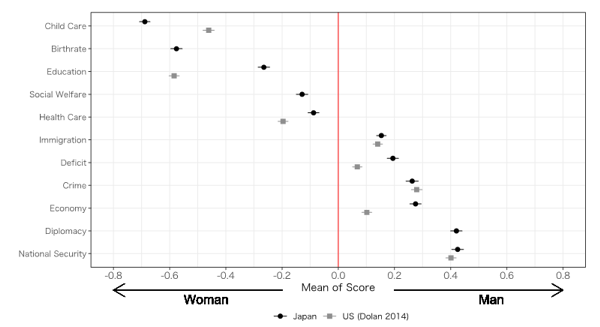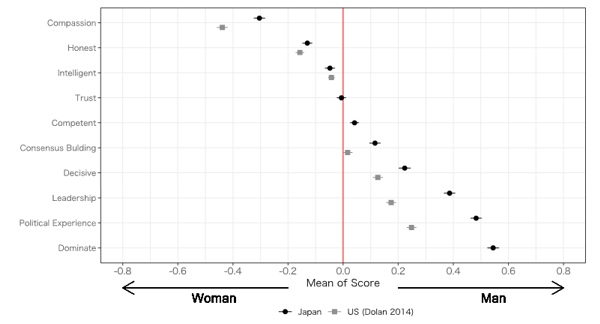Gender Gap in Politics
The gender gap in politics in Japan is one of the largest of all advanced countries. The proportion of seats held by women in the House of Representatives, the lower chamber of the Diet (Japan’s national parliament), is 9.7%, far below the average of 25.9% among the 193 countries around the world (Note 1). Why are women so underrepresented in the Diet? One possible reason for the gender gap in political representation may be that gender stereotypes held by voters are putting women candidates at a disadvantage in elections.
Gender Stereotypes
Social psychology research shows that gender stereotypes can lead to prejudice and discriminatory behavior. So, what stereotypes do Japanese voters have with respect to men and women politicians?
A Survey with Japanese Voters
In order to identify the stereotypes held by Japanese voters, we conducted an online survey with around 3,000 voters in March 2019. In the survey, the same set of questions was asked in the same format as that used in a survey previously conducted in the United States (Note 2) so that the tendencies among Japanese and American voters could be compared. This article provides a brief summary of the gender stereotypes observed among Japanese voters with respect to policy areas and personal traits. For information on the specifics of the survey, please refer to a relevant RIETI discussion paper (Note 3).
Gender Stereotypes regarding Policy Areas
The survey asked the respondents whether men or women politicians are generally better at handling each of 11 policy areas, requesting them to choose one of three response options: “men,” “women,” and “no gender difference.” Figure 1 shows a summary of the results, which indicate that Japanese voters have stereotypes very similar to those held by American voters. Specifically, the percentage of Japanese respondents who considered men politicians to be better at handling policy areas such as crime/public order, economics/employment, national security, immigration, and fiscal deficit was higher than the percentage of those who considered women politicians to be better at handling them. On the other hand, the percentage of Japanese respondents who considered women politicians to be better at handling such policy areas as education, healthcare, childcare/child welfare, the shrinking population of children, and pension/social welfare was higher than the percentage of those who considered men to be better at handling them.

[Click to enlarge]
Gender Stereotypes regarding Personal Traits
Regarding personal traits, the survey asked the respondents whether each of 10 attributes may be better ascribed generally to men or women politicians. Figure 2 shows the results, which indicate a similar tendency to that observed in the United States. While Japanese voters consider men politicians to be better at consensus building and more decisive, have stronger leadership, be more politically experienced and more dominant than women politicians, they regard women politicians as being more compassionate, honest and intelligent. However, as to trustworthiness, voters recognized little difference between men and women politicians.

[Click to enlarge]
Influence of Gender Stereotypes
How do such gender stereotypes influence voting behavior? When voters have gender stereotypes, if a man or woman politician expresses an opinion in a policy area that is perceived to be outside of his/her expertise, voters may react negatively to that opinion or view the politician negatively because of the stereotypes. For example, if a female politician actively speaks out or expresses an opinion in the area of national security, which is often perceived as a “male prerogative,” voters may react with skepticism or evaluate the politician negatively.
According to the results of a survey experiment conducted by the author in 2015 with the participation of around 2,700 voters, not only do Japanese voters tend to generally prefer men candidates over women, but also women candidates can lose votes if they fail to conform to the stereotypes (Note 4). In other words, while the emphasis on their gender tends to disadvantage women candidates, failure to behave in a “feminine” manner may be perceived negatively. Therefore, women candidates are expected to face more difficulties compared with men when considering what electoral strategy to adopt.
The question of how gender stereotypes affect voters' views of politicians and their behavior has only just begun to be researched both domestically and internationally, and is not yet fully understood. I look forward to further progress in the research, as finding answers to this question is expected to provide clues to narrowing the gender gap in politics.


